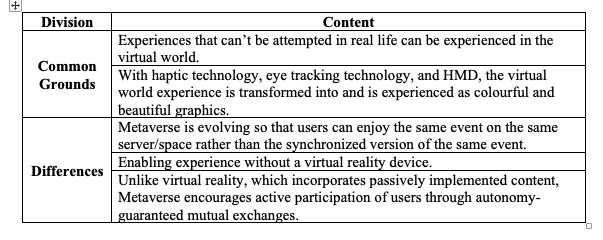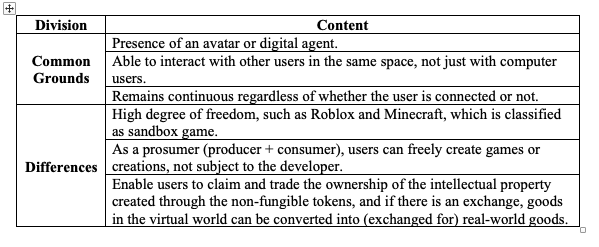Metaverse, VR and MMORPGs - A Brief Explanation
未经允许,谢绝转载。本文仅限于交流,不得用于任何商业目的。
Comparing VR(virtual reality) with Metaverse (for gaming)
One of the important factors in explaining the concept of the Metaverse is virtual reality(VR).
VR currently referred to means an artificial technology created to experience a virtual environment similar to or completely different from real-life reality through images, sounds, and other senses, or spatial-temporal (space-time) concept that enables such virtual interactions.
VR can be said to be the forerunner of the Metaverse space, because VR is a three-dimensional online experience that allows users to leave the real world and experience not only the things that likely happen in the real world, but also gain experiences that are impossible in the real world.
However, due to the limitations of current haptic technology, eye tracking technology, and HMD lightweight technology, there are technical difficulties in realizing VR at the level of <Ready Player One>.
Currently, the fields where VR technology is most actively used are entertainment, education, medical care, occupational and emergency safety, etc. Apart from the recreational purpose, and within the context of occupational and emergency safety, VR is used to predict and train personnel in advance so that humans gain first-hand experience before the dangerous or contingent situations strike.
Virtual reality can be used as a tool to collaborate with multiple people, but unlike MMORPGs, Metaverses is evolving into a visible implementation that allows a large number of people to see the same event in real time, rather than viewing a synchronized version of the same event on a distributed server. In other worlds, the existing VR is distinguished from the Metaverse due to differences such interaction, simultaneous connectivity, and device necessity.
Google explains that VR, along with AR (Augmented Reality), is playing a role in bridging the digital world and the real world. In particular allows people to experience what it's like to be able to go anywhere. That is, it makes it possible to feel as if you were there, even on another planet outside of Earth. VR is thus focused on the experiential aspects that resembles reality. Users can see, hear, and experience based on the images, information, and rules already set in the VR environment, and users are not allowed to create desired objects or perform new actions as imaged.
VR is distinguished from the Metaverse in that it is a passive digital environment, while within Metaverse interaction is established through active participation among users. In other words, virtual reality (VR) imitates reality, but is another digital world, and the user enters the space using a technological device to access the virtual reality space, and is immersed in the virtual experience experienced there. VR is a spatial and environmental prerequisite for the Metaverse to be realized, but VR itself cannot be equated with the Metaverse which has a connection point with the real world.
VR has the constraint that you can enjoy the virtual world only by using an HMD or VR experiential device, but since Metaverse is ultimately considering building an ecosystem where you can enjoy the virtual world in the online world without the need for HMDs or haptic devices, purchasing a device to enjoy the Metaverse may be an additional option, but it is not a prerequisite.

Comparing MMORPGs with Metaverse (for gaming)
The Metaverse is being commercialized based on existing games or social media. Then, among them, the game-based Metaverse can be viewed as a concept that is different from other services or technologies such as MMORPG and VR, which already encompasses certain features that share among them.
Prior research that most closely depicts the Metaverse in detail when it is implemented, including features such as similarity to the real world, non-existent virtuality, and user engagement, is the scenario in the Metaverse Roadmap Project (MVR) published by ASF as early as 2007.
MVR is a pan-industrial project formed to present a ‘short-term’ forecast (until 2017) and ‘long-term’ forecast (about 2025) in 2007 for the future realized by virtual and 3D technology. The organized the Metaverse Summit to collected opinions from experts and the public in the same way as public hearings, workshops, conferences, debates, and surveys. Various groups from the virtual world and IT industry workforce, experts, academia, futurists, and the general public community contributed to MVR’s idea formation.
https://www.metaverseroadmap.org/
In order to understand the concept of Metaverse, its meaning is often defined in comparison with MMORPGs. MMORPGs is a form that emerged along with the transformation of RPG (role-playing game) to online. RPGs, which originally evolved and presented in the form of board games, video games, and the like, now have the characteristic of being enjoyed simultaneously in the same space where enables access by a large number of users due to development of the high-speed internet.
What MMORPGs and Metaverses have in common is, first, the presence of avatars or digital represents.
Second, it is possible to interact with users other than computers within the space.
Third, the continuity is guaranteed as the user's access point does not define the duration of the game. In other words, since the start and end of current games is defined as being connected or terminated by a specific user, MMORPGs and Metaverses share a feature that the virtual world does not disappear even if a specific user disconnects from the connection.

